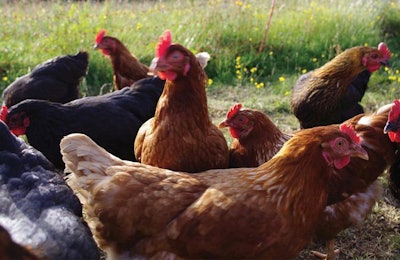
While a ban on commercial duck and goose production in parts of France is in place to break the spread of highly pathogenic avian influenza (HPAI) in Europe, previously imposed control measures are being relaxed in the United Kingdom and Romania.
The danger of avian flu has not passed throughout all of Europe, however. New outbreaks have been reported in the last week in poultry flocks in Hungary, Russia and Sweden, and another wild bird has tested positive for the virus in Finland.
France: temporary ban on rearing ducks, geese
In the municipalities of southwest France where the great majority of HPAI outbreaks caused by the H5N8 virus have occurred since last November, a ban was put in place on April 17 on the commercial farming of all ducks and geese, according the agriculture ministry. The move followed an announcement on April 14 by agriculture minister, Stéphane Le Foll, that the risk of contamination of poultry with the HPAI virus by wildlife had been lowered to moderate.
Providing no HPAI viruses are detected in the meantime, the ban on duck and goose farming will be lifted on May 28. During this period, along with the depopulation, producers have been called on to strengthen measures to exclude wild birds from poultry feed, water sources and range areas, to clean and disinfect buildings, and to dispose of all potentially infectious litter and manure. These measures apply even to farmers who do not intend to return to domestic waterfowl production.
New HPAI cases in poultry in Russia, Hungary, Sweden
Russia’s veterinary authority has reported two new outbreaks of HPAI caused by the H5N8 virus to the World Organisation for Animal Health (OIE) in the last week. Affected were a farm with more than 99,000 poultry in Rostov oblast, and a small backyard flock in Moscow oblast.
From the southern county of Bacs-Kiskun in Hungary, officials have reported four new outbreaks of HPAI to the OIE, all starting in the second week of April. All these outbreaks involved geese, leading to the loss of more than 5,500 birds of varying ages. Three of the outbreaks were in the same district.
After an absence of almost three months, H5N8 HPAI appears to have returned to Sweden. According to the report to the OIE, an egg farmer in Södermanland county in the southeast of the country observed elevated mortality in one of four poultry houses containing 50,000 birds in the third week of April. Surviving birds were humanely destroyed, and the usual control measures have been put in place. Sweden’s last HPAI outbreak was in a backyard flock in the same county at the end of January.
Veterinary authorities in Germany and Italy have not reported any new HPAI outbreaks in the last week.
Only Finland has recorded the recent detection of the H5N8 HPAI virus in wild birds. An eagle found dead in the Aland Islands has tested positive for the virus.
HPAI control measures lifted in Romania, UK
Following a period with no new HPAI outbreaks, Romania’s animal health agency has reported to the OIE that restrictions and disease controls have been lifted.
In England, the UK’s chief vet has announced that biosecurity measures currently in place to reduce the risk of HPAI will be lifted on May 15, according to the government agriculture department, Defra. From that date, the Avian Influenza Prevention Zone (AIPZ) will end, and poultry keepers will no longer be required by law to follow specific disease prevention measures to reduce the risk of infection from wild birds. However, they are being urged to continue to follow industry standard best practice on biosecurity, including minimizing movements in and out of bird enclosures, cleaning footwear, keeping areas where birds live clean and tidy, and feeding birds indoors. A ban on poultry gatherings, which has been in place since December 2016, is scheduled to end on the same date.
The Scottish government has confirmed that the AIPZ covering its territory will end on April 30, and that a new general license coming into force on May 15 will lead to the lifting of the present ban on poultry shows and gatherings.
The AIPZ in Wales due to expire on April 30, will not be replaced, according to the Welsh government.
In Northern Ireland, the agriculture department, DAERA, has confirmed that the AIPZ has been prolonged until May 31. Poultry keepers are permitted to allow their birds outside if they comply with additional biosecurity measures.

















